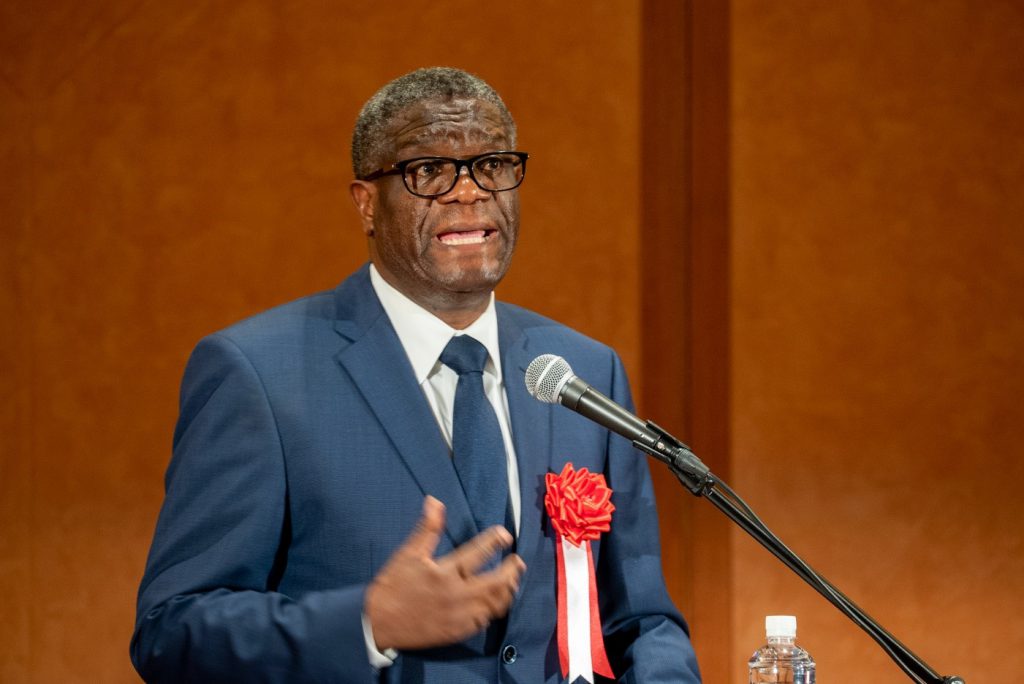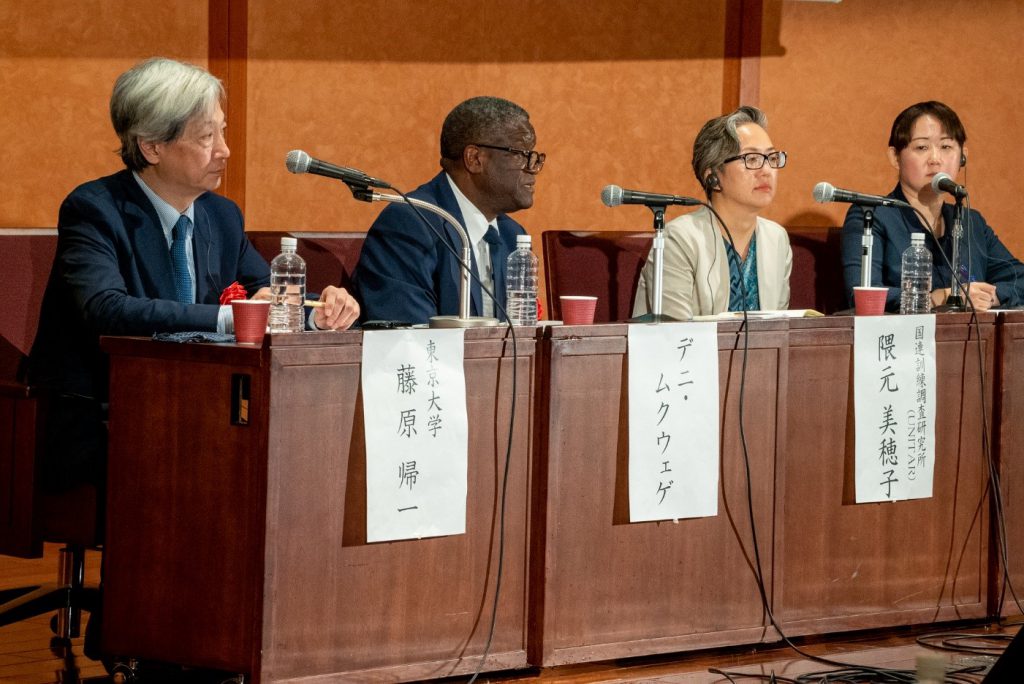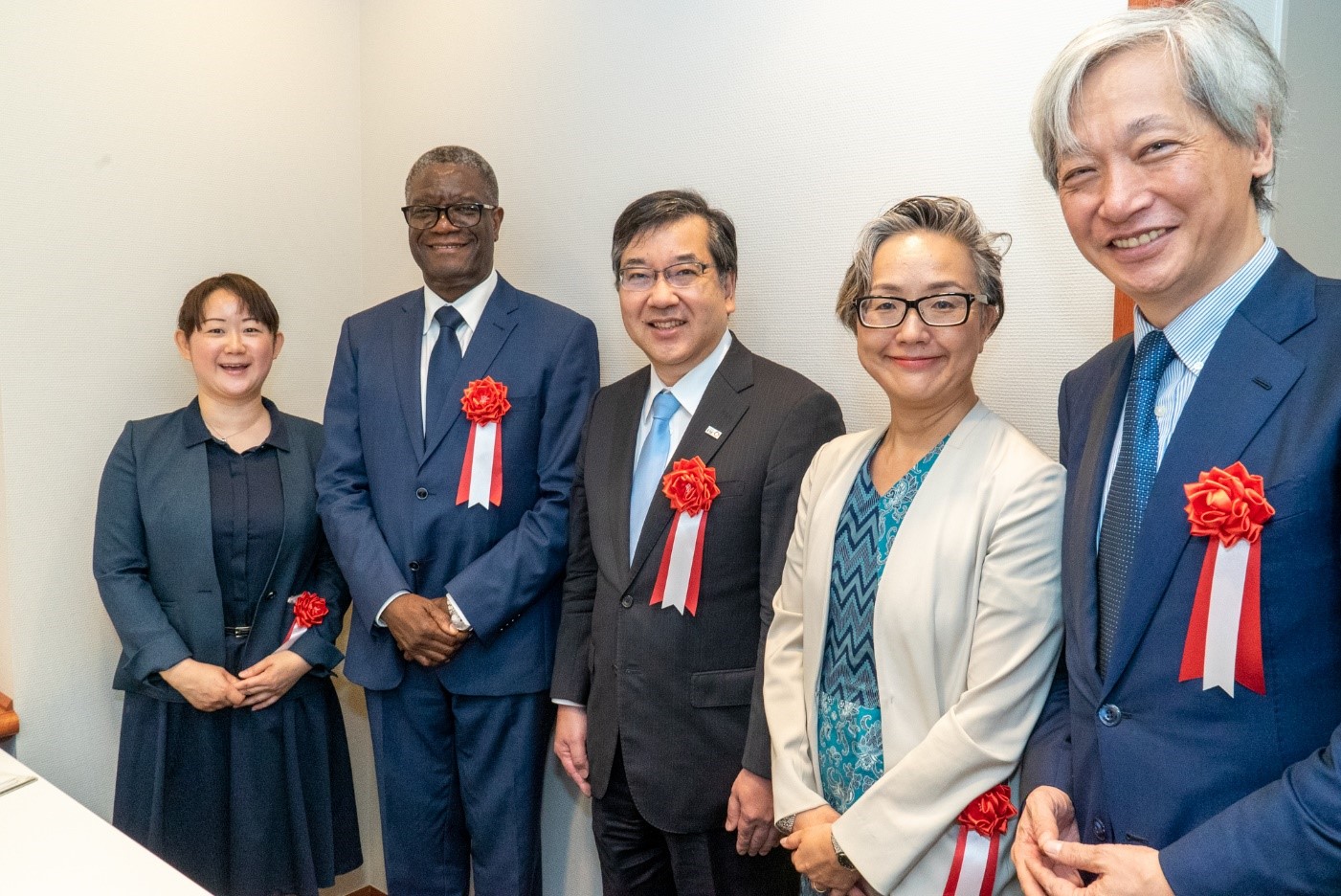Ito International Research Center Conference the 2018 Nobel Peace Prize Laureate Dr. Denis Mukwege’s Special Lecture on “Peace, Justice, and Women’s Rights”
- Date:Fri, Oct 04, 2019
- Time:12:30-15:00
- Location:Ito Hall, Ito International Research Center, Hongo Campus, the University of Tokyo
MAP - Host:
Institute for Future Initiatives, the University of Tokyo (SDGs Collaborative Research Unit)
Grant-in-Aid for Scientific Research (A): The Nexus of International Politics in Climate Change and Water Resource: From the Perspective of Security Studies and SDGs - Co-host:
Association on Sexual Violence and Conflict in the DR Congo (ASVCC)
Grant-in-Aid for Scientific Research (B): Relations Between Minerals Extraction and Human Rights Violation in Conflict - Cooperation:
The Mitsubishi Foundation
The Takagi Fund for Citizen Science - Capacity:
400 seats (In the order of registration arrival)
- Language:
Japanese, English, and French (simultaneous interpretation)
- Application Period:
10:00, September 10, 2019 (Tuesday) – 17:00, September 25, 2019 (Wednesday)
*The number of applicants reached the limit, the application process was closed on Sptember 12, 2019.
Please note that this symposium has reached its full capacity and the registration is closed. Only pre-registered participants can join this event (walk-in registrations will not be accepted). Thank you very much. - Notes:
Please refer to the notes below before you apply.
1) Identification
On the day of the symposium, we will confirm your identity at the reception. So please make sure to bring a printout of the automated email response to your application to participate in the symposium, as well as a photo ID* card that can verify your identity.
If your identity cannot be confirmed, you will not be permitted to enter the venue no matter the reason.
*Driver’s license, passport, resident registry card with a photo, “my number” card with a photo, student ID with a photo, residence card, etc.2) Security measures
・Your baggage will be checked when you enter the venue.
・Umbrella, foldble umbrella, liquid contained in a bottle, can, PET bottle, thermos, etc., as well as hazardous materials,
will be banned.
・Large luggage cannot be brought inside. Please deposit such belongings at the cloak room.
・If you engage in disruptive acts and interfere with the lecture, or if you refuse to comply with the instructions of the organizers, you may be asked to leave.
Since the onset of the violent conflict in DRC in 1996, the civilian death toll is estimated to have reached 6 million. In particular, in eastern DRC, human rights have constantly been violated by the 100-odd armed groups operating in the area. Most of these groups have been funded by both the exploitation and trafficking of rich mineral resources. Related to these mineral dealings and violence, systematic sexual violence has been used as a weapon of war with the aim of destroying the victim, her family, and her community. This event looks to offer a platform to understand the structural causes of sexual violence in a conflict zone and discuss how to realize peace and justice, where human rights of the socially vulnerable are protected. The lecture by Dr. Mukwege will shed more light on the latest situation of sexual violence in the conflict zone of eastern DRC and on his continuous efforts to ensure women’s rights (SDG 5), peace, justice, and democratic stability (SDG 16), and fairness (SDG 10) in the DRC. Moreover, this event will offer an opportunity to discuss with researchers of research institutions engaging in international security and peace building, and aid agencies committed to the resolution of conflict.
- Opening Remarks
Makoto Gonokami, President, the University of Tokyo
- Introduction
Kiichi Fujiwara, Director, Institute for Future Initiatives (IFI)
- Keynote Speech
Denis Mukwege, Medicine Director, Panzi Hospital
- Comment1
Mihoko Kumamoto, Director, the United Nations Institute for Training and Research (UNITAR) Hiroshima Office
- Comment2
Kazuyo Hanai, Assistant Professor, Institute for Future Initiatives (IFI)
- Q&A (Panel discussion)
- Closing Remarks
Dr. Denis Mukwege, a gynecologist who treats and assists victims of sexual violence in the Democratic Republic of Congo (hereafter, “DRC”) was invited to present a lecture to explain how social instability caused by conflicts and natural disasters affects local residents. After hearing about the latest situation of sexual violence in the conflict zones of eastern DRC from Dr. Mukwege, a panel discussion was held with the participation of a UN expert committed to conflict resolution, to provide an opportunity to understand the structural causes of sexual violence in conflict zones and to consider what we can do from Japan for resolution.
(1)Opening Remarks: Makoto Gonokami, President, the University of Tokyo
President Gonokami began by congratulating Dr. Mukwege on winning the Nobel Peace Prize. He then spoke about the sense of crisis about how the world is becoming more divided in many aspects, the need to build a new global ecosystem based upon the principles of the United Nations Sustainable Development Goals (SDGs), and his vision to make the University of Tokyo a “global base for knowledge collaboration” to contribute to the future of the planet and human society. Finally, he emphasized the importance to learn from Dr. Mukwege’s lecture and understand the problems occurring in DRC.
(2)Introduction: Kiichi Fujiwara, Director, Institute for Future Initiatives (IFI)
IFI Director Fujiwara raised the issue of the trend whereby current initiatives for SDGs are generally focused on the domestic conditions inside Japan, and stressed that which issues need to be addressed right now should be considered in light of the university’s responsibility to look beyond national boundaries, in line with the intent of this lecture meeting.
(3)Keynote Speech “Peace, Justice and Women’s Rights”: Dr. Denis Mukwege, Medical Director, Panzi Hospital
* The full text of the speech is presented at the end of this report.
The conflict in DRC has continued since 1996, resulting in six million deaths and over four million refugees and internally displaced persons, and hundreds of thousands of women have been subjected to sexual violence. On average, 10 victims are brought each day to the Panzi Hospital operated by Dr. Mukwege in eastern DRC. While the four pillars of medical care, psychological care, economic assistance, and legal assistance are important in aid to victims, Dr. Mukwege stressed the need of addressing the issue of non-punishment in order to realize a fundamental resolution of the problem. There are many international treaties that guarantee women’s equality today. In practice, however, conditions whereby women’s rights are still unprotected remain rampant in each country, and that has become a cause for the continuation of sexual violence. Dr. Mukwege mentioned the Mapping Report published in 2010 by the Office of United Nations Commissioner for Human Rights, which recorded 617 most serious violations of human rights and international humanitarian law in DRC. The perpetrators of these crimes are still in power, and none of the recommendations in the report have been implemented. In closing, Dr. Mukwege introduced the Global Fund for survivors of sexual violence which will be established on October 30, 2019, and passionately called for breaking the silence and acting toward realizing a world without sexual violence, which is a crisis of humanity.

(4)Panel Discussion
The panel discussion began with an introduction of United Nations’ efforts to address sexual violence by UNITAR Hiroshima Office Director Kumamoto. The UN has passed important resolutions regarding this issue including Security Council Resolution 1325 and Security Council Resolution 2467, and various UN organizations are implementing concrete activities for conflict prevention and women’s empowerment.
Next, IFI Assistant Professor Hanai presented the structure of sexual violence in wartime and the efforts presently underway. Concerning efforts by Japan, she noted that the (1) grasp of the situation, (2) verification of the results of measures taken, and (3) debate toward resolution are all insufficient.
Following these comments, the panel discussion centered on UN conflict prevention efforts and the conflict resolution effects expected of compensation for victims of sexual violence. Dr. Mukwege stressed that even when the UN passes appropriate and important resolutions concerning sexual violence, there is the issue that suitable punishment and reparations are not provided at the stage where these are implemented in practice. He also explained that by supporting countries that lack expertise and means for reparations and ensuring reparations and care for victims, the new Global Fund will demonstrate that care of victims is a basic human right. The Q&A session included the following.

Q. What do you expect from the Japanese government and citizens?
A. Dr. Mukwege: Sexual violence victims need your voice. We want Japan to speak up on their behalf so that perpetrators are tried. We also want Japan to appeal to the UN Security Council so that suitable punishments are handed down for the crimes documented in the Mapping Report and the international court for DRC called for in the report is realized.
Q. Aside from underground minerals, aren’t there other fundamental causes of the conflict, such as poverty and the lack of democracy?
A. Dr. Mukwege: The structure whereby DRC’s resources are exploited by other nations has continued since the colonial era when rubber was exploited, followed by uranium from 1945 and coltan today. Sexual violence is being used as a weapon for the structure of exploitation with the rape of women right before the eyes of their parents, and husbands, and children. The root cause of the conflict is an economic system that destroys individual and community identity.
Q. What should be done to resolve disparities in Japan, where women have low status in politics and economics?
A. Dr. Mukwege: When I co-chaired the G7 Advisory Board for Gender Equality, we recommended, first, the introduction of innovative legislation to give more social responsibility to women, and second, to exercise the courage to repeal and eliminate discriminatory laws.
Finally, Dr. Mukwege stressed the necessity of breaking the silence. “When a woman attempts to accuse sexual violence, she is told to be silent. This means that she is humiliated twice, by the rape and by being forced to keep silence about the rape” he says. He explained that a society without sexual violence can also conquer the negative aspects of patriarchy, and that men and women must fight together to achieve equality. Overall, the symposium shared the importance of raising our voices to make sexual violence visible in society.
